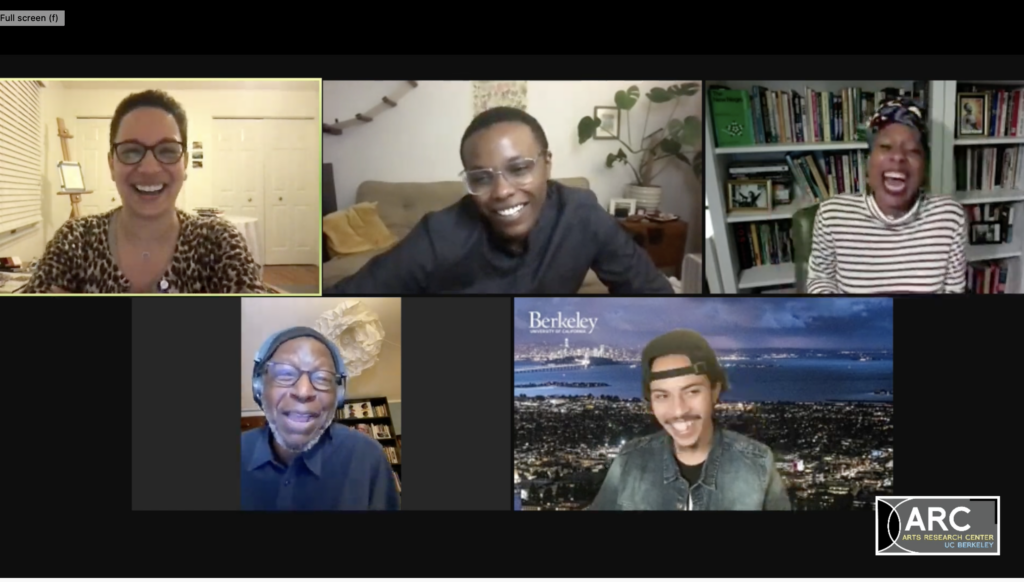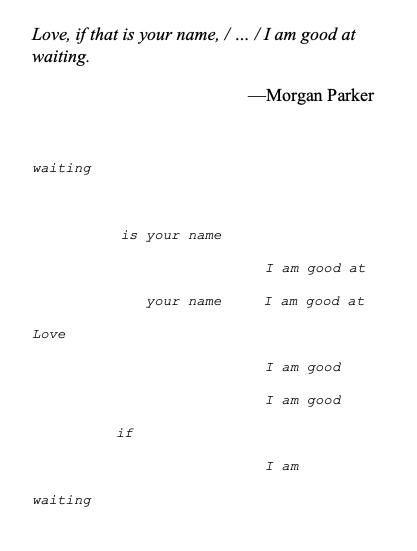Celebrating Cave Canem: Cornelius Eady, Morgan Parker, & Cameron Awkward Rich, in conversation with Chiyuma Elliott & Vincente Perez
By: Menat Allah El Attma, November 29, 2021
Why not start at the darkest place?
Morgan Parker, before reciting any poetry from the page, speaks it naturally. Imagine her words: yourself, to begin with darkness. If we can see Darkness as a beginning, an end is not an end but a shift. Darkness is a transitory space that allows for a reposition, for an/other way or possibility. This returns to an earlier line of Cameron Awkward-Rich’s: “Some days I am the darkest thing I’ll see”. Imagine again: to see oneself darkly. And particularly, to know it is only a beginning opens deep relief.
Fact: Red, blue, and yellow (the three primary colors) altogether make black.
If red, blue, and yellow make black, then black is not only dark but colorful. Darkness, then, is not the absence of light/color but the presence of connection. Coexistence, as Parker illuminates, involves a multiplicity: “sad and funny, grateful and horrified. How can we think about things together?” Awkward-Rich adds onto this beautiful discussion of coexisting today as a poet in the practice of writing as something done with others, not separate from. It is a necessity; and once honored, this need becomes a matter of truth. Coexistence, along a coinciding brush, is “a dangerous word” too. Cornelius Eady prompts us to consider power dynamics of the political land with which we must contend. Coexistence may feel like an American or Western term, but it is still far from Eden. It has also proven life to be negotiable, “deadly”. Awkward-Rich describes it best, of this place as a bus and “Everywhere / the bus is a kind of underworld.”
By writing poetry, we imagine a there elsewhere and together. The page is as much a technology as it is a dream. Being among other poets, Awkward-Rich clarifies that “What is the point, what is the value of this?” is no longer a question and “I can just come to the page.” And so, the writer emerges between impulses and impressions—a sublime composition wherein language offers a soft landing place to meet, to color, to blend, and to “reserve for discovery”. Eady and Parker share sentimentally: “If you know what’s going to happen, then why are you doing it?”

Cornelius Eady, and Vincente Perez
This reclaim of beauty over mystery in poetry, practice, and the poetic self returns me to color. A fundamental core of writing is editing and revision, they agree. Understanding how words speak together (how we speak with them, and how they speak with us too) is a mystical experience that expands and stretches, lights and dims. You may find what you are creating is pure and an accident, and both can coexist. You may also find what is most personal is also most universal.

The full recording of the event is available for viewing on our YouTube channel, here.
Menat Allah El Attma is an Egyptian Muslim woman, educator, writer, and visual artist. Menat graduated from UC Berkeley with a BA in English literature and is pursuing her teaching credential. She is a logophile and linguaphile, working to affect a similar love for words/languages in her students through the practice and art of storytelling. She believes art is in the telling of the story as much as the story itself. Menat was a 2020 ARC Poetry & the Senses fellow.
